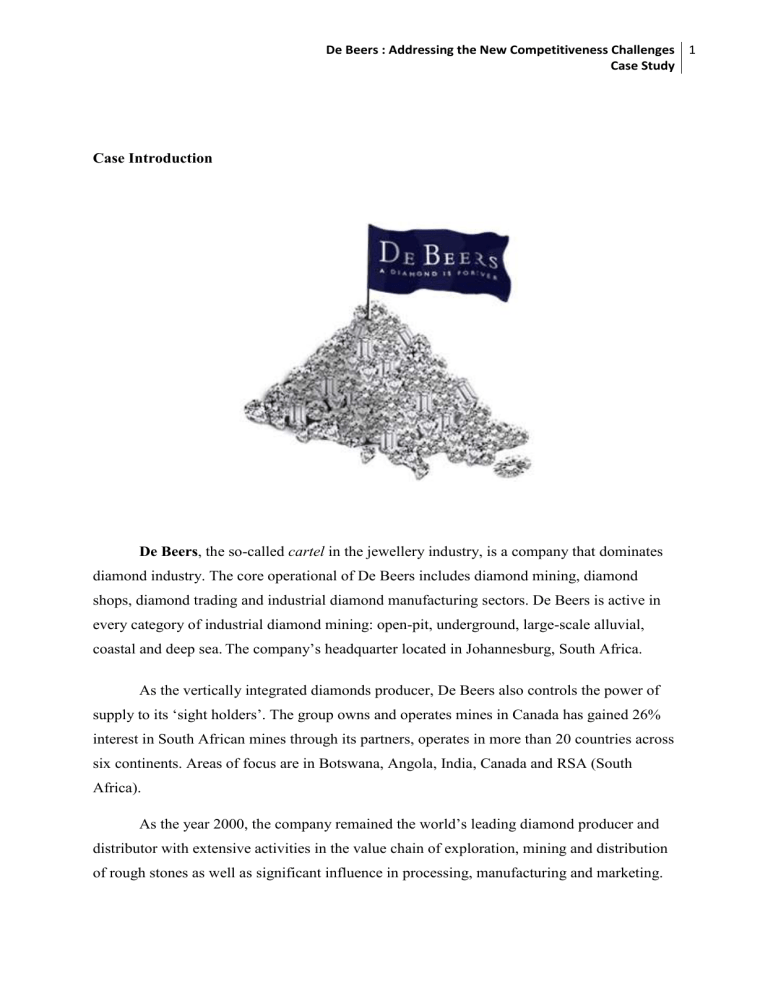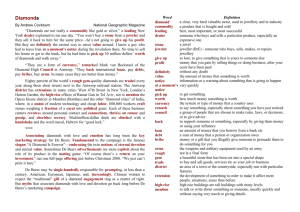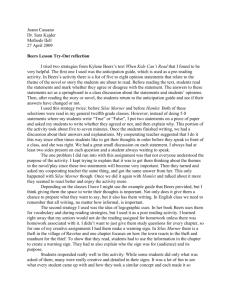
De Beers : Addressing the New Competitiveness Challenges 1 Case Study Case Introduction De Beers, the so-called cartel in the jewellery industry, is a company that dominates diamond industry. The core operational of De Beers includes diamond mining, diamond shops, diamond trading and industrial diamond manufacturing sectors. De Beers is active in every category of industrial diamond mining: open-pit, underground, large-scale alluvial, coastal and deep sea. The company’s headquarter located in Johannesburg, South Africa. As the vertically integrated diamonds producer, De Beers also controls the power of supply to its ‘sight holders’. The group owns and operates mines in Canada has gained 26% interest in South African mines through its partners, operates in more than 20 countries across six continents. Areas of focus are in Botswana, Angola, India, Canada and RSA (South Africa). As the year 2000, the company remained the world’s leading diamond producer and distributor with extensive activities in the value chain of exploration, mining and distribution of rough stones as well as significant influence in processing, manufacturing and marketing. De Beers : Addressing the New Competitiveness Challenges 2 Case Study History of De Beers: Cecil Rhodes Era Founder of De Bees, Cecil Rhodes started the company by renting water pumps to diggers with flooded claims during the diamond rush in 1871. He seized opportunities to purchase and consolidate claims and later entre mines. Among the rights he purchased was the right to mine the De Beers brother’s farm, whose name became the name if his company. Rhodes used his market position and access to credit to engineer a merger with Barney Barnato (who managed to obtain a large stake in Kimberly’s biggest mine), in 1888 to form De Beers Consolidated Mines. De beers controlled close to 100% of South African diamond output and 90% of world diamond output. Its position was so formidable that when the company reduced production in 1888, rough-stone process quickly rose by 50%. By 1893, Rhodes had established a single buyer, the Diamond Syndicate. It was also Rhodes, who never married, who conceived of the idea of diamonds as a symbol of committed romance. Rhodes became the prime minister of Cape Colony in 1890, ad enacted laws benefiting mine owners. The Glen Grey Act effectively relocated native Africans from their lands to make way for industrial development. Rhodes was responsible for laws restricting voting rights to literate person, but also championed educational reforms. During his reign, he named the country as ‘Rhodesia’ (Zimbabwe since 1980), and by the ruling time, commissioned railways, bridges, schools and public buildings has emerged efficiently. Rhodes died in 1902. De Beers’ share of rough diamonds had fallen to 40% due to a large discovery at Premier, a competing local mine, though De Beers owned a stake in its production. De Beers stepped up its focus on buying and consolidating mines as opposite arose. While the company would remain without a forceful new leader until the 1920s, the system put in place by Rhodes endured. De Beers : Addressing the New Competitiveness Challenges 3 Case Study Ernest Oppenheimer Era Ernest Oppenheimer, came to South Africa as a diamond buyer. He would become mayor of Kimberly in 1908 and a member of the South African Parliament in 1924. Oppenheimer builds up diamond interest and founded the Anglo-American Corporation in 1924. He then set out to link gold and diamonds, and began purchasing every known diamond mine in the early 1920s including new fields in Namibia. Oppenheimer not only purchased mines, but also established a distribution system independent of dominant De Beers syndicate. Oppenheimer began raising the issue of racial problems in Johannesburg, where he lived, and lobbied for creation of modern native villages and social progress for black Africans. As a member of the United Party and a member of parliament, Ernest opposed the Afrikaner nationalist. Unfortunately, the Nationalist Party came into power in 1942. And the era of apartheid, or institutionalized racial discrimination began. Harry Oppenheimer Era Harry, son of late Ernest became the CEO of De Beers in 1957 until 1984. Harry was born to an assimilated Jewish family of German origins in Kimberly, the original center for diamond mining in South Africa, and lived most of his life in Johannesburg. Harry Oppenheimer was also known for his philanthropy. From 1967, the social investment activities of De Beers were merged with those of Anglo American in the Group Chairman’s Fund. The fund initiated and finances numerous projects that contributed to community development on a large scale in South Africa, particularly in the arenas if education and heals. De Beers was instrumental in establishing a number of schools and technical colleges for black students. Following the Soweto riots in 1976, Harry established the Urban Foundation to improve, directly and through legislative reform, the social and industrial environment of urban native Africans. The slogan on ‘Diamond is forever’ was created during his time with De Beers. De Beers : Addressing the New Competitiveness Challenges 4 Case Study Nicholas Oppenheimer Era In 1985, Harry’s son Nicholas succeeded him as a Chairman. In addition to expanding the exploration to Botswana, the partnership was to include the rough diamond trading business and other related profit making activities. Through the 1980s and 1990s, De Beers geologist explored in Angola, Australia, Brazil, Bolivia, Canada, China, DRC, Lesotho, Namibia, Russia, Venezuela and Zimbabwe. Through this period, De Beers also expanded its advertising program worldwide; in 1972 in Spain and Brazil; in 1977 in Holland, Belgium, Austria, and Switzerland; in 1979 in Mexico; in 1982 in Singapore, the Philippines, Thailand, Malaysia and Taiwan; and 1984 in India and Korea. In the mid-1990s, De Beers has implemented plans to ensure that its mines in Africa met 3rd party certified environmental management standards. De Beers also set aside nature reserves around mining areas in South Africa, Botswana and Namibia and commenced programs to protect rare biodiversity. Problem Statements The end of apartheid era in 1994, has written down several changes in the policies made in South Africa. The situation become different for the native people where high priority then given to them instead of the Afrikaners. While recognizing that diamond mining had made economic contributions, a growing proportion of policymakers in Africa believed that the diamond industry had not generated sufficient contribution by way of value-added processing activities. Therefore the Minerals Development Bill was drafted by the South African Department of Minds and Energy (DME) which would become the county’s new mining law by year 2000 and gibe the state exclusive custodianship of all mineral rights. Then a new policy called ‘Black Economic Empowerment’ (BEE) came into the scene in 2000 with a goal of creating opportunities for previously disadvantaged communities and individuals, including black Africans, women and people with disabilities. De Beers : Addressing the New Competitiveness Challenges 5 Case Study In addition to the changes in policies as one of the biggest challenges, a potential threat came into the gem market by the advancing technologies, for synthetic production. Thus, De Beers needed a new strategy to override with both rapidly changing industry environment and new expectations of society. SWOT Analysis Strengths Weaknesses Its reputation of monopoly Strong investment in marketing and Good – strong reputation with the Issue with mines that are offset with civilization areas. ruling government. High operating cost (exploration, mining, sorting and distribution) advertisement. Strong competitors from other brands Opportunities Threat Exploration expansion to tap the Apartheid issue market areas. Strong competitors from other brands. Technology advancement. Racial issue could cause angry mobs Backed by government policies to to destroy the mining equipment support the health of the industry. (loss) De Beers’ 4-legged Strategy First Legged: To improve efficiency and Second Legged: To stimulate demand of margins from De Beers own operations diamond by at least 5% per year. Third Legged: To establish De Beer’s own Forth Legged: Suppliers of Choice (SOC) – brand that directly meets the end customer. to improve efficiency and productivity sight holders. De Beers : Addressing the New Competitiveness Challenges 6 Case Study Recommendation Despite having shares in the major mining area since late 1920s, De Beers should expand/ to make effort to penetrate to new ventures of exploration areas. This is due to demand of synthetic industrial diamonds which is largely used in lots of fields: medical, drilling tools for oil & gas, entertainment industry especially in acoustic devices and others. As a analyser, I couldn’t see any issues of expansion, since De Beers has been the market leader for almost half of the century. In order to manage the societal crisis, De Beers can improve its labour policies by giving more benefits such as insurance, incentives, and other related compensation. Apart from that, the company should determine a minimum wage for its labour, and the company should keep on protecting the rights against child labour which happens to be a serious problem is African continents. To maintain a good CSR, De Beers should implements ways to give back to the community. Prevention campaign such as HIVs, poverty and starving which are quite popular in the African countries should be carried out efficiently to ensure that De Beers is the organization that cares, for what it’s worth to public images. It is also important to sustain the efficiently of providing good diamonds to the world, just for the company to stay relevant in the industry. In order to achieve that, De Beers must focus its core business as the producer of pure diamonds, not only focusing much on synthetic quality. De Beers : Addressing the New Competitiveness Challenges 7 Case Study


